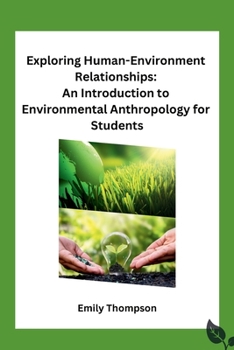Exploring Human-Environment Relationships: An Introduction to Environmental Anthropology for Students
In today's world, where environmental issues have become increasingly critical, it is crucial for students in the field of anthropology to understand the importance of human-environment relationships. Environmental anthropology focuses on the interaction between humans and their environment, examining how different societies adapt to and impact their surroundings. This subchapter will delve into the significance of these relationships, emphasizing their relevance to students studying anthropology.
First and foremost, understanding human-environment relationships allows us to comprehend the intricate connections between culture and nature. Throughout history, humans have shaped their environments and, in turn, have been shaped by them. By studying these relationships, students can gain insights into how different cultures perceive and interact with the natural world. This knowledge provides a foundation for understanding the diverse ways in which human societies have adapted to their environments and developed sustainable practices.
Moreover, recognizing the importance of human-environment relationships is crucial for addressing contemporary environmental challenges. Climate change, deforestation, and pollution are just a few examples of the pressing issues our planet faces. Anthropologists play a vital role in finding solutions to these problems by studying how different cultures have successfully coexisted with their surroundings. Through their research, students can learn from traditional knowledge systems and indigenous practices, offering innovative approaches to sustainability and conservation.
Furthermore, studying human-environment relationships fosters a deeper understanding of the social, economic, and political factors that influence environmental decision-making. By examining how power dynamics shape environmental policies and practices, students can critically analyze the impact of these decisions on different communities. This knowledge is crucial for advocating for more inclusive and equitable approaches to environmental management.
Lastly, understanding human-environment relationships is not only important for anthropology students but for society as a whole. As citizens, we must recognize our place within the natural world and the responsibility we hold towards preserving it. By studying these relationships, students can develop a sense of environmental stewardship and contribute to creating a more sustainable future





